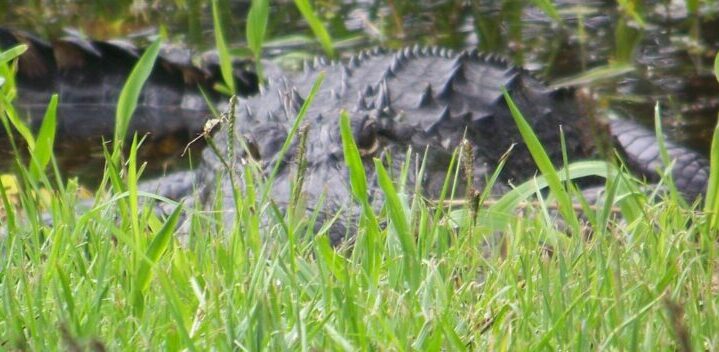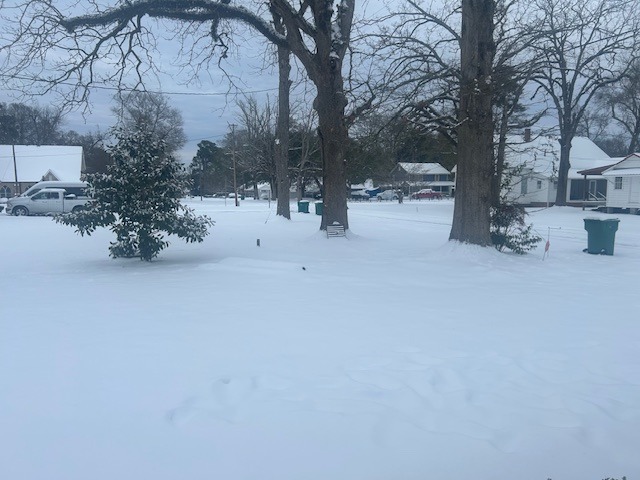This year has the hallmarks of being a banner season for alligators at Lake Waccamaw, and officials are stressing the danger of feeding the large reptiles.
The exploding population of gators (due to the state’s conservation programs) has made gator watching a popular pastime with residents and visitors at Lake Waccamaw. Casual surveys indicate the population is even larger than usual this year – both in numbers and size.
Several unusually large gators have been spotted relaxing beside the canal recently, leading to great photo opportunities for gator watchers along Canal Cove, Waccamaw Shores and Bella Coola. With the onset of mating season, more alligators are likely to be out and about, and not as likely to hide when humans pass by.
While gator watching is encouraged, that should be the limit of interaction with the saurians.
The N.C. Wildlife Resources Commission reminds the public that it is illegal to feed, touch, harm, harass or poach an alligator in North Carolina. While they rarely pose a threat to humans, alligators can become a nuisance when people either intentionally or unintentionally feed them, which causes them to associate humans with an easy meal.
To keep from unintentionally attracting alligators, people should not feed other animals — including ducks, geese, fish or turtles — in waters where alligators live. Feeding wildlife or disposing of scraps beside the canal draws alligators searching for an easy meal, and they start to see humans as their own meal delivery service.
“For the sake of other animals, keep in mind that even if you aren’t feeding them bread — which is nutritionally poor for wildlife and is known to cause a wing deformity in birds — it causes them to gather in unnaturally large groups and increases transmission of diseases between animals,” said Alicia Wassmer, the Commission’s alligator biologist.
Also, anglers should always take their fish scraps with them or dispose of them in a trash receptacle rather than throwing them in the water, especially in places frequented by people, such as boat ramps. Gators have been known to hang around the canal near the Sigmon Boat Landing, where anglers sometimes dump leftover bait or offal from cleaning fish. Some are even attracted to live or artificial baits.
“If an alligator becomes attracted to your fishing lure, don’t continue to cast in its vicinity and move to a different spot to fish if necessary,” Wassamer said.
Spring is an optimal time to see alligators because mating season is in full swing and alligators are moving more in search of a potential mate. However, simply seeing an alligator in the wild is no cause for alarm.
“People should enjoy the opportunity to see an alligator but remember to observe them from a safe and respectful distance, regardless of their size,” Wassmer added. “For their own safety and out of respect for nature, people should always keep a distance of at least 50 feet from any alligator in the wild.
“For reference, the length of a full-size school bus is about 35 feet long, so you could picture about one and a half buses between you and the alligator.”
To avoid negative interactions with alligators, it is best to:
- Keep pets on a leash and do not allow them to swim, drink or exercise in or near waters where alligators have been seen.
- Be especially mindful in and around waters where alligators have been seen.
- Never approach an alligator — no matter what its size.
Alligators very seldom pose a threat to humans. In instances when an alligator is seen in an unusual place, such as a pond or ditch, it will more than likely move away on its own within a few hours to a couple of weeks.
On rare occasions, alligators can end up in situations that require human intervention, such as when one becomes trapped in a swimming pool or wanders into a public road and refuses to move. In those cases, only an authorized WRC employee or individual with appropriate permits issued by the Commission can remove it legally.
Anyone with questions or concerns about alligators can reach one of the wildlife biologists that staff the Commission’s N.C. Wildlife Helpline toll-free at 866-318-2401 between 8am-5pm Monday – Friday. Visit the agency’s website for downloadable PDFs on how to Coexisting with Alligators and an American Alligator wildlife profile.
To report instances of poaching, harming, harassing or intentionally feeding alligators, call the Wildlife Commission’s Enforcement hotline, 1-800-662-7137. Instances of poaching also can be reported through the agency’s Turn-in Poachers program.







